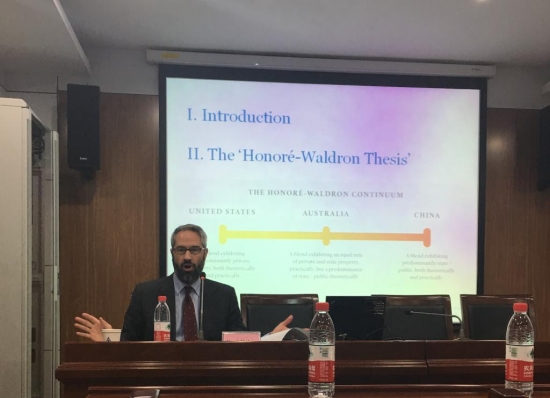On April 18th2016, as a part of the visiting scholar program of China-Australia Research Partnership for Judicial Civilisation (“CAPJC”), Professor Paul Babie, Associate Dean of Adelaide Law School was invited to deliver a lecture at China University of Political Science and Law on Australia Property Law. This lecture was jointly hosted by the 2011 Plan - Collaborative Innovation Center of Judicial Civilization (“CICJC”) and the Institute of Evidence Law and Forensic Science of CUPL, presided by Professor Zhuhao Wang, the co-director of CAPJC.

To begin with, Professor Paul Babie gave a brief introduction to the thesis of Honoré-Waldron. Australia, the United States, and China belong to three different jurisdictions which have different property law systems. Intuitively, property law in the United States is more about private property. In China, collective property is more concerned while Australian falls in between.
From the perspective of Australia, Professor Paul Babie analyzed the concepts of four ideal property types briefly. These four types of property are Private Property, Common Property, Public/State Property and Communitarian Property.
There are three liberal rights in Private Property, the right to use, the right to exclude and the right to disposition. The most important is that only “I” have the right to exercise this three kinds of rights. “I” can be an individual, an organization or a company; this right illustrates human relationships and the corresponding relationship between rights and obligations. Common Property mainly refers to resource that cannot be excluded others from using. There are only two kinds of resources in the United States and Australia can truly be called Common Property, sunlight and wind. For Public/State Property, there is no different from Private Property in content of the right; what makes these two types of property different is who has the right to determine, in State Property, it has to be the state, and the exercising condition will be detailed by Congressional legislation. Other than Common Property, Communitarian Property contains the exclusive right to use, and it features the process of the right.
Further, Professor Paul Babie illustrated the operation of each property. Taking Fee Simple Estate as an example of Private Property, the three liberal rights mentioned above are held by individuals and can be inherited directly. Fee Simple Estate is private right in practical reality, however it is state right in theory, as the state takes that lands if the owner died without heirs.
As to Common Property, Australia and more countries attempt to regulate the sunlight and wind power in legislation, for adapting to the increasingly significant climate issues.
Crown Land, as an example of Public/State property, is the land possessed by state except for that distributed to individuals. Most of Crown Land which is idle land is supplied to shepherd by Perpetual Lease. To a certain extant, it reverts to Private Property.
Communitarian property dates back to the rights and tradition among people who live in Australia before British colonized. The exclusive rights result from the recognition of claims when Courts of jurisdiction file claims against the native title group according to the law.
Professor Paul Babie summarized this lecture and indicated that there are different property law systems in each jurisdiction. The classification of property is so significant that, on one hand, it helps us understanding the property system in different jurisdictions; on the other hand, it concerns about the security of investment. This lecture featured as the first step of the development of China-Australia Research Partnership of Judicial Civilisation, which is one of the ten major overseas bases of CICJC.
Reporters: Siyun LIAO and Rushi REN
Institute of Evidence Law and Forensic Science
China University of Political Science and Law